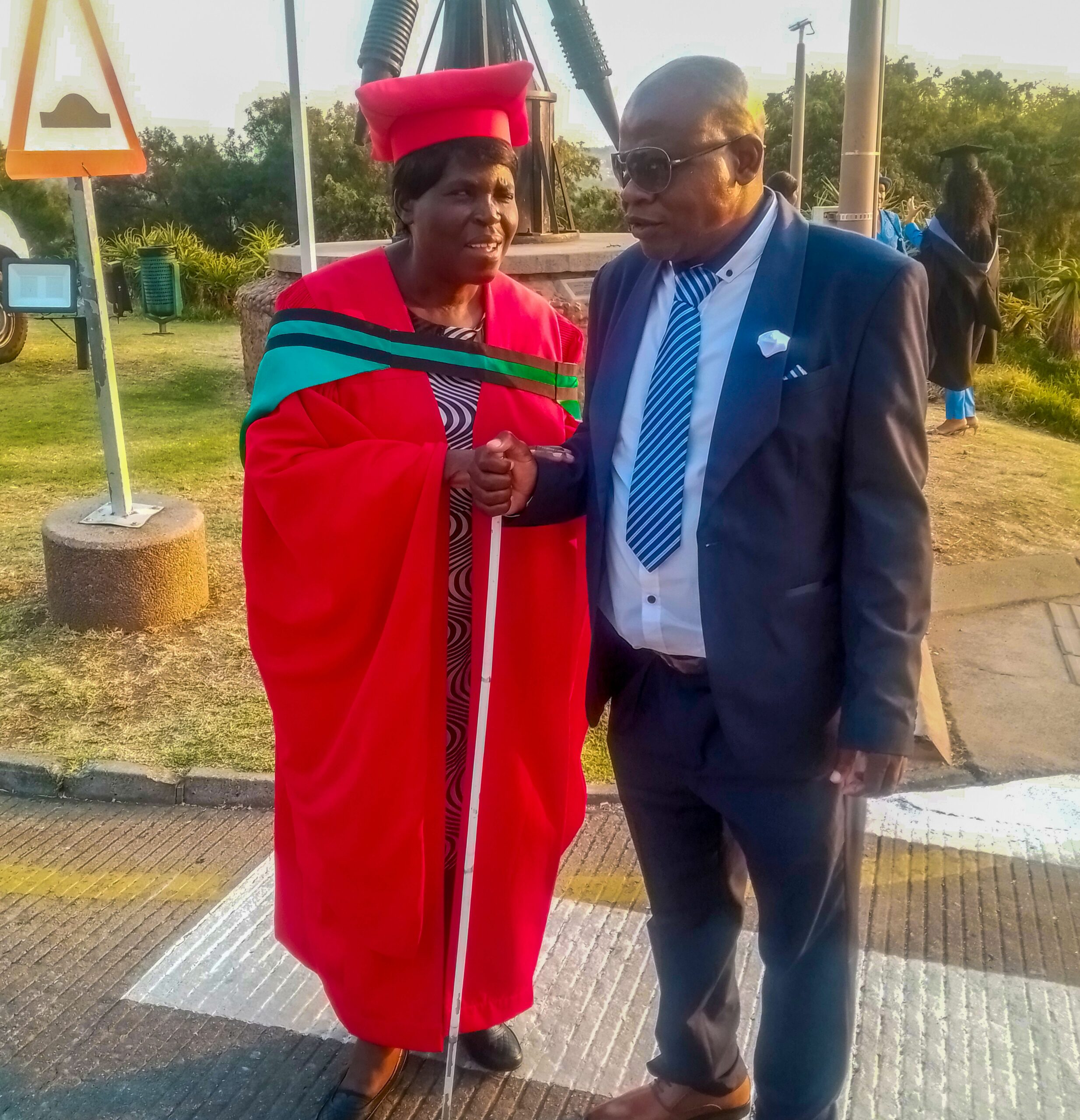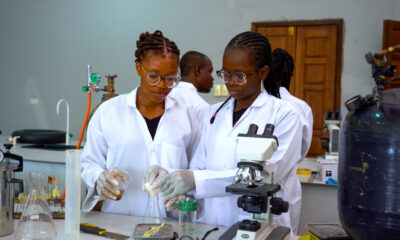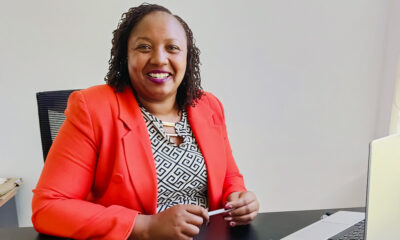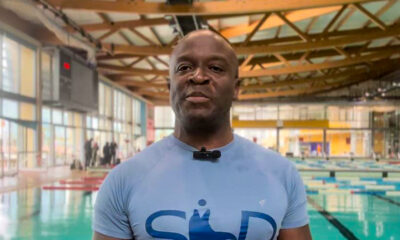Inspired
Visually Impaired PhD Holder Farisai Mlambo Champions Inclusivity for Teachers in Schools
By Walter Marwizi for bird story agency

Farisai Mlambo and her husband during her graduation ceremony at the University of South Africa on October 4, 2022. Photo Credit: Farisai Mlambo
The rapturous applause that rang out during the graduation ceremony at the University of South Africa on October 4, 2022, must have been particularly satisfying for 52-year-old Farisai Mlambo.
Just before the visually impaired Zimbabwean researcher took the stage to receive her Doctor of Philosophy degree, it was said that she had contributed new information that would help teach visually impaired students around the world.
But despite the recognition, that moment was just one stage in Mlambo’s long and determined educational journey.
Farisai Masocha was born in the Mazvhihwa communal area in Zvishavane, Zimbabwe. She was the third of 19 children in a polygamous family, and she grew up in this area with her eyes open. But when she got measles at age five, it hurt her eyesight a lot and caused her to lose her sight.
This disability forced her to delay going to school, and she only managed to start Grade One at Gundekunde Primary School when she was 10.
When her father saw that the rural school wasn’t ready for his child, he got her a spot at the Copota School for the Blind in Masvingo province. Even though there were not enough braille books or food at Copota, the young girl felt at home with other children who had the same trouble seeing as she did.
“The school had funding challenges. I had to listen attentively when other children who had mastered braille started reading the scarce books. I also vividly remember being served sadza (thick porridge) with powdered milk,” she said.
Despite these problems, she went to the school for her primary and secondary education. In 1994, she went to Gutu High School to study at a higher level. While Copota had been a haven for blind pupils, Gutu High was the opposite. Her visual impairment stood out like a sore thumb among students with normal eyesight, which resulted in untold discrimination and loneliness.
“I could walk alone, following the others,” she said, her face betraying emotion. “It was very tough.”
This unkind treatment, however, did not distract her from focusing on her goal of getting a good education.
“Because of my low vision, I could not write like other students but was proficient in braille. The challenge was that none of my teachers could understand it. It was an untenable situation.”
The Zimbabwe Council of the Blind helped her out by giving her a typewriter, which was a sought-after machine at the time. This allowed her to carry out assignments successfully. But the solution bred the seeds of another crisis, as she had to walk around with a huge load: a typewriter, a braille writer, heavy braille books, and typed documents. The school authorities realised her dilemma and intervened.
“They gave me an office where I would operate from, but then, some students who were avoiding the noisy classrooms noticed it was a perfect place to study and went there,” she explained. “That is how my integration with other students started. I ended up having a best friend, Faith Mufanebadza.”
She passed her Advanced Levels and got a temporary teaching post at Mavhiringidze High School in 1997. Once again, though, she was met with hostility because teachers weren’t used to working with someone who couldn’t see.
“They had attitudes,” she recalled. “They could hardly associate with me.”
That same year, Hillside Teachers’ College posted ads for teacher training vacancies. The college, on the other hand, needed proof that a student who couldn’t see could do well in school. Again, the Council of the Blind came to her rescue, this time supporting her application.
“I was given a room to operate from, but there were no braille materials, so someone would read the books for me while I listened.”
As she worked on her studies, she had to study in this painfully slow way every day.
“When I got a job as a teacher, my sister, Vongai, was my assistant,” she noted.
After brief stints at Mutero and Cheninga schools, she went to teach at Copota in 1999, where she married Tawanda Mlambo, who is totally blind. The couple is blessed with four children. “Despite being a mother, I was determined to study, and in 2003, I enrolled in a block release program at the Great Zimbabwe University, where l obtained my first degree, a Bachelor of Education in English.”
In 2012, she became a lecturer at Morgenster Teachers Training College. A year later, she went back to school to get a Master’s in Education Languages with an English focus. When she completed the program, she decided to aim for the big one—a doctorate.
“I started with UNISA Online in 2016. I relied on an assistant to gather information. We would go on the internet, and I would instruct her. She would Google sources and read, and I would listen and absorb the information. I needed a lot of money for data because the network was often poor. We would arrive at 9 a.m. and leave at 4 p.m.,” she said.
Commenting on how she achieved the feat, Dr. Mlambo, now a lecturer in the Department of Teacher Development at the Great Zimbabwe University (GZU), attributed her success to both internal and external motivation.
“I always had this drive in me. A drive to overcome obstacles in my way. I also got support from my assistants; without them, I also could not have done it.”
She is, however, quick to caution that life is tough for people with visual impairments, even when one holds a PhD like herself.
“Society discriminates. If you don’t see it, and worse, if you are a woman, that can be a double tragedy. I know that because I am a woman and I have a disability. Sometimes when you have meetings, you are looked down upon. They think you are not capable. This is the case in many sectors where disabled people are sidelined. Society is not allowing them to lead and progress.”
She thinks attitudes can change if the government and private organizations, including schools, do more to help people with disabilities.She also wants teachers and lecturers to embrace braille.
“I experienced the agony of having teachers who did not understand braille. I wish to change that by teaching braille to both lecturers and students at GZU and carrying out outreach to encourage children living with disabilities to take their studies seriously. I believe this can go a long way to ensure inclusion for visually impaired people and many children who have a component of special needs, like hearing impairments.”
Mlambo is not only passionate about studying but also has an interest in sports. “I participate in paralympic games and was a coach for athletic games in which I am certified to train visually impaired students,” she said.
Mlambo has won a number of paralympic medals at Morgenster Teacher Training College. She hopes that one day she will be able to train paralympians at GZU and help students with disabilities achieve success in sports.





















